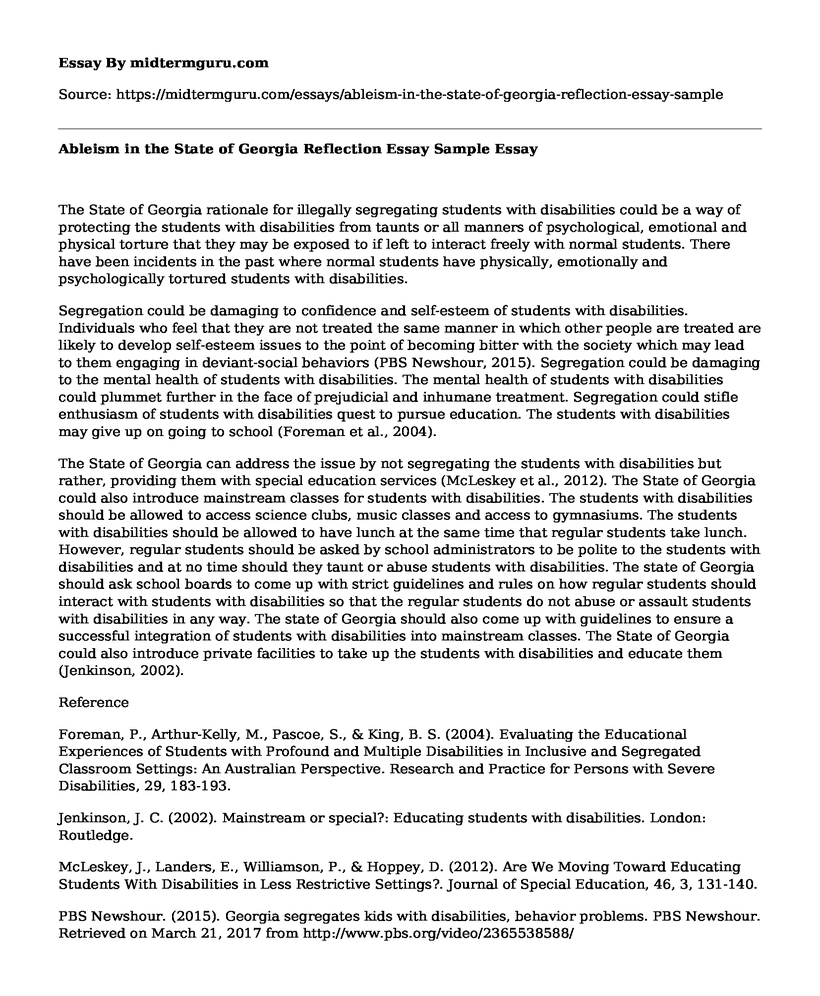The State of Georgia rationale for illegally segregating students with disabilities could be a way of protecting the students with disabilities from taunts or all manners of psychological, emotional and physical torture that they may be exposed to if left to interact freely with normal students. There have been incidents in the past where normal students have physically, emotionally and psychologically tortured students with disabilities.
Segregation could be damaging to confidence and self-esteem of students with disabilities. Individuals who feel that they are not treated the same manner in which other people are treated are likely to develop self-esteem issues to the point of becoming bitter with the society which may lead to them engaging in deviant-social behaviors (PBS Newshour, 2015). Segregation could be damaging to the mental health of students with disabilities. The mental health of students with disabilities could plummet further in the face of prejudicial and inhumane treatment. Segregation could stifle enthusiasm of students with disabilities quest to pursue education. The students with disabilities may give up on going to school (Foreman et al., 2004).
The State of Georgia can address the issue by not segregating the students with disabilities but rather, providing them with special education services (McLeskey et al., 2012). The State of Georgia could also introduce mainstream classes for students with disabilities. The students with disabilities should be allowed to access science clubs, music classes and access to gymnasiums. The students with disabilities should be allowed to have lunch at the same time that regular students take lunch. However, regular students should be asked by school administrators to be polite to the students with disabilities and at no time should they taunt or abuse students with disabilities. The state of Georgia should ask school boards to come up with strict guidelines and rules on how regular students should interact with students with disabilities so that the regular students do not abuse or assault students with disabilities in any way. The state of Georgia should also come up with guidelines to ensure a successful integration of students with disabilities into mainstream classes. The State of Georgia could also introduce private facilities to take up the students with disabilities and educate them (Jenkinson, 2002).
Reference
Foreman, P., Arthur-Kelly, M., Pascoe, S., & King, B. S. (2004). Evaluating the Educational Experiences of Students with Profound and Multiple Disabilities in Inclusive and Segregated Classroom Settings: An Australian Perspective. Research and Practice for Persons with Severe Disabilities, 29, 183-193.
Jenkinson, J. C. (2002). Mainstream or special?: Educating students with disabilities. London: Routledge.
McLeskey, J., Landers, E., Williamson, P., & Hoppey, D. (2012). Are We Moving Toward Educating Students With Disabilities in Less Restrictive Settings?. Journal of Special Education, 46, 3, 131-140.
PBS Newshour. (2015). Georgia segregates kids with disabilities, behavior problems. PBS Newshour. Retrieved on March 21, 2017 from http://www.pbs.org/video/2365538588/
Cite this page
Ableism in the State of Georgia Reflection Essay Sample. (2021, Jun 14). Retrieved from https://midtermguru.com/essays/ableism-in-the-state-of-georgia-reflection-essay-sample
If you are the original author of this essay and no longer wish to have it published on the midtermguru.com website, please click below to request its removal:
- Essay on Critical Thinking, Problem Solving and Creativity
- Essay on Collaborative Skills in Modern Institutions
- Essay Sample on Learning Bilingusim and Multilingusim
- Conduct of Children: Birth Order & Social Influence in Schools - Research Paper
- Georgetown Summer Sessions - Essay Sample
- Essay Sample on Skin-to-Skin Contact With Newborn
- Article Analysis Essay on "City of Broken Dreams"







